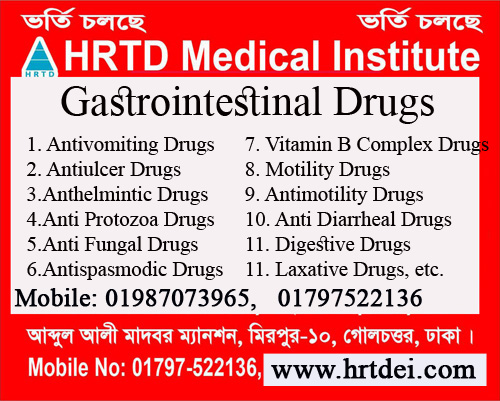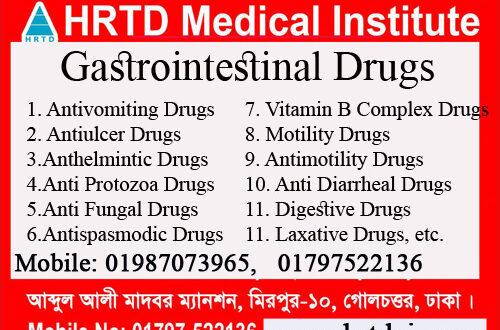Gastrointestinal Drugs & Pharmacology Details
Gastrointestinal Drugs. Mobile Phone Number. 01797522136, 01987073965. Gastrointestinal Drugs are used to treat gastrointestinal diseases.

These drugs are Anti-vomiting Drugs, Anti Ulcer Drugs, Motility Drugs, Anti Motility Drugs, Anti Diarrheal Drugs, Laxatives Drugs, Some Vitamines, Anti Protoza Drugs, Antifungal Drugs, Antibacterial Drugs, Anti Spasmodic Drugs, etc. Gastrointestinal Drugs are a common topic in some courses at HRTD Medical Institute. These courses are Paramedical, Diploma Medical Assistant, Diploma in Medicine and Surgery, Diploma in Paramedical, DMDS 4 Years Course, PDT Gastrology Course, PDT Medicine Course, etc.
Anti-vomiting Drugs are Gastrointestinal Drugs
The drugs that are used for the treatment of Vomiting and Nausea are called Anti Vomiting Drugs. Anti Vomiting Drugs are Domperidon, Ondansetron, Palonosetron, Hyoscine Hydrobromide, Meclizine and Pyridoxine, Prochlorperazine,
Domperidone is usually used to stop vomiting associated with flatulence.
Ondansetron and Palonosetron are used to stop vomiting associated with drugs, chemotherapy, radiotherapy, etc.
Hyoscine hydrobromide is used to stop vomiting associated with journey
Meclizine and Pyridoxine are used to stop vomiting during pregnancy
Prochlorperazine is used to stop vomiting associated with vertigo.
5-HT3 Receptor Antagonist Antivomiting Drugs
Serotonin (5-HT3) receptor antagonists block the vomiting reflex by inhibiting 5-HT3 receptors in the vomiting center, the chemoreceptor trigger zone, and in the small intestine. These drugs are used to treat nausea and vomiting triggered by cytotoxic drugs.
These drugs are:
Ondansetron
Granisetron
Palonosetron
Dolasetron
Patient selection for 5-HT3 Receptor antagonist:
(1) Drug-induced vomiting (Especially after chemotherapy)
(2) Radiation-induced vomiting ( X-Ray, Radiation therapy)
Antiulcer Drugs are most common Gastrointestinal Drugs
যে সকল drug Hyperacidity and Peptic ulcer disease এর চিকিৎসায় ব্যবহৃত হয় তাদেরকে anti ulcer drug বলে I Antiulcer Drugs গুলিকে 3 টি group এ ভাগ করা হয় ।
(1) Proton Pump Inhibitor Drugs
(2) H2 Receptor Blocker Drugs
(3) Antacid Drugs
Proton Pump Inhibitor Drugs (PPI Drugs) are Gastrointestinal Drugs
The drugs that inhibit the proton pump in the Gastric Wall are PPI Drugs. Proton Pump is a biological mechanism by which Hydrochloric acid is produced.
- Omeprazole
- Esomeprazole
- Pantoprazole
- Rabeprazole
- Lansoprazole
- Dexlansoprazole
H2 Receptor Blocker Drugs are Gastrointestinal Drugs
The drugs that block the H2 Receptors of the Gastric Wall are H2 Receptor Blocker Drugs. These drugs are shortly called H2 Blocker Drugs. H2 Receptors are molecules that help produce Hydrochloric acid.
H2 Blocker Drugs are:
Famotidine
Cimetidine
Antacid Drugs are Essential Gastrointestinal Drugs
The drugs that are used for neutralizing the excess Hydrochloric acid in the gastric lumen are Antacid Drugs. Common Antacid Drugs are:
Aluminium Hydroxide [ Al (OH)3 ]
Magnesium Hydroxide [ Mg (OH)2 ]
Anthelmintic Drugs are used as Gastrointestinal Drugs
The drugs that are used against helminths are Anthelmintic Drugs. These drugs are also called Antihelminthe Drugs.
Generic Name Of Anthelmintic Drugs are:
- Albendazole
- Mebendazole
- Pyrantel pamoate
- Levamisole
Anti-protozoa drugs are used as Gastrointestinal Drugs
The drugs that are used against protozoa are anti-protozoa drugs. Anti Protozoa drugs are used for the treatment of Amebic dysentery, Amebic liver abscess, and Amebic gingivitis. Common anti-protozoa drugs are:
- Metronidazole
- Ornidazole
- Secnidazole
- Tinidazole
- Nitazoxanide
Nitazoxanide এর common drug knowledge গুলি উল্লেখ কর ।
Common Drug Knowledge of Nitazoxanide in Pharmacology-2:
Description of Nitazoxanide:
Nitazoxanide হচ্ছে একটি synthetic antiprotozoal drug. ইহা pyruvate এর সাথে interfere করে । ফলে protozoa এর membrane damage ঘটে এবং তার ফলে cellular dysfunction ঘটে ।
Indication of Nitazoxanide:
- Diarrhea
- Amoebiasis
- Helminth infection
Contra Indication of Nitazoxanide:
Hypersensitivity reaction হলে দেওয়া যাবে না ।
Dosage form of Nitazoxanide:
500mg Tab. Syp 100 ml/5 ml
Dose of Nitazoxanide:
- Adult: 1 tab twice daily -3 days
- Age 4-11 years: 10 ml twice -3 days
- Age 1-3 years 😛 5 ml twice -3 days
Side effects of Nitazoxanide:
কোন side effect নেই
Pregnancy category of Nitazoxanide:
B Category
Drug Interaction of Nitazoxanide:
No Drug Interaction
Storage of Nitazoxanide:
সাধারন তাপমাত্রায় পরিষ্কার তাকে রাখতে হবে
Antifungal Drugs
The drugs that are used for the treatment of fungal infections are antifungal drugs. These drugs are used for the treatment of Oral thrush and Glossitis. Common Antifungal Drugs are:
- Fluconazole
- Ketoconazole
- Itraconazole
- Econazole
- Miconazole
- Nystatin
- Terbinafine
Visceral Antispasmodic drug
Visceral Antispasmodic drugs are those used for the treatment of Visceral Spasm. Common Visceral Antispasmodic Drugs are:
- Timonium methyl sulfate ( Tablet and IM/IV injection are available. Injection is applied for quick result)
- Dicycloverine Hydrochloride
Vitamin B Complex
Vitamine B Complex is used for the treatment of Gastrointestinal disorders ( Diarrhea, Constipation), Beribari, Glossitis, and Angular Stomatitis. Vitamine B Complex is the combination of all B vitamins. Vitamine Bs are Vitamine B1, Vitamine B2, Vitamine B6, Vitamine B12, etc.
Vitamine B Complex is available in Bangladesh ( Tablet, Capsule, Syrup, and IM/IV Injection.
- B-50 Forte
- Opsovit
- Aristovit B
- Placent B
Gastrointestinal Drugs for Motility
The drugs used to increase the peristalsis movement of the digestive system are Motiligy drugs. Common motility drugs are Domperidone, Metoclopramide, Dopamine antagonist, Buspirone, Calcium channel blockers, Butylscopolamine, and Acetylcholinesterase inhibitors.
Domperidone (Domperidone is a medicine that increases the movements or contractions of the stomach and bowel. Domperidone is also used to treat nausea and vomiting caused by other drugs used to treat Parkinson’s Disease.)
Metoclopramide (Metoclopramide is used to treat the symptoms of slow stomach emptying (gastroparesis) in patients with diabetes. It works by increasing the movements or contractions of the stomach and intestines. It relieves symptoms such as nausea, vomiting, heartburn, a feeling of fullness after meals, and loss of appetite.)
Dopamine antagonist (Dopamine antagonists are drugs that keep certain types of cells in our brain from activating. They’re a key type of drug for treating certain mental health conditions and symptoms, especially psychosis and schizophrenia. In simple terms, they’re dopamine receptor blockers.)
Buspirone (Buspirone is a medication that treats anxiety.
It balances the levels of dopamine and serotonin in your brain.
These are hormones that help regulate your mood)
Butylscopolamine (Hyoscine butyl bromide, also known as scopolamine butyl bromide and
sold under the brand name Buscopan among others, is an anticholinergic medication
used to treat abdominal pain, esophageal spasms, bladder spasms, biliary colic, and renal colic)
Acetylcholinesterase inhibitors (Acetylcholinesterase inhibitors (AChEIs) also often called cholinesterase inhibitors, inhibit the enzyme acetylcholinesterase from breaking down the neurotransmitter acetylcholine into choline and acetate, thereby increasing both the level and duration of action of acetylcholine in the central nervous system, autonomic ganglia and neuromuscular junctions, which are rich in acetylcholine receptors).
Calcium channel blocker (Calcium-channel blocking agents have a potential role in the regulation of gastrointestinal tract function by decreasing smooth muscle contraction and possibly inhibiting cellular secretion. Most studies to date have concentrated on the ability of these drugs to inhibit smooth muscle contraction). Calcium channel blockers are mainly cardiovascular drugs. These drugs reduce blood pressure. So, These drugs should not be administered without the consultation of a Registered Physician.
Digestive Drugs/Digestive Enzymes are Gastrointestinal Drugs
The drugs used for food digestion are digestive Drugs. Common digestive drugs are:
Pancreatin
Pancrelipase
Lactase
Sacrosidase
Alpha-D galactosidase
Cholic acid
Digestive enzymes are proteins that speed up the breakdown (hydrolysis) of food molecules into their separate components
(for example, sucrose is split into glucose and fructose).
These reactions happen within the gastrointestinal tract (GI),
and most of the digestive enzymes present naturally in our bodies are secreted by the pancreas into the small intestine via the pancreatic duct.
Laxative Drugs are Common Gastrointestinal Drugs
Laxatives are medicines that help resolve constipation or empty the bowel of fecal matter before procedures or surgery involving the lower bowel.
There are several different types available (see differences below) and each type works in a particular way.
Some soften or loosen up the stool, while others increase how frequently the large colon contracts which helps move the stool along the bowel. Laxative Drugs are:
Magnesium hydroxide
Magnesium sulfate
Methylcellulose
Lactulose
Polyethylene glycol 3350
Glycerin
Bisacodyl
H. pylori eradication Drugs
Drugs used to treat Helicobacter Pylori are medicines used for stomach acid inhibition, combined with antibacterial agents. Treatment is for one week with a proton pump inhibitor, antacid (or antisecretory agents), and two appropriate antibacterial agents. This one-week triple therapy does give a good eradication rate.
Amoxicillin + Clarithromycin+ Lansoprazole
Or, Amoxicillin + Clarithromycin + Omeprazole
Antidiarrheal Drugs are Common Gastrointestinal Drugs
Antidiarrheals are the name given to certain types of medicines that stop or slow diarrhea. Antidiarrheals only relieve the symptoms of diarrhea, such as an increased frequency and urgency when passing stools, they do not eliminate the cause of it. So proper treatment should be done after investigation of causes.
Antidiarrheal drugs are:
Loperamide
Racecadotril
Atropine
Bismuth subsalicylate
Lactobacillus acidophilus
Chloride channel activators are Gastrointestinal Drugs
A chloride channel activator drug is a locally acting agent that activates chloride channels in the intestine and increases the secretion of intestinal fluid that helps pass the stool. It is used to treat chronic constipation, especially in patients who have little or no benefit from stool softeners or laxatives.
Chloride channel activator drugs are:
Lubiprostone ( Lubistone 8 mcg and 24 mcg- Incepta )
Medical conditions treated with chloride channel activators
Chronic Idiopathic Constipation
Constipation
Irritable Bowel Syndrome
Irritable Bowel Syndrome with Constipation
Opioid- Induced Constipation
 HRTD Medical Institute
HRTD Medical Institute





